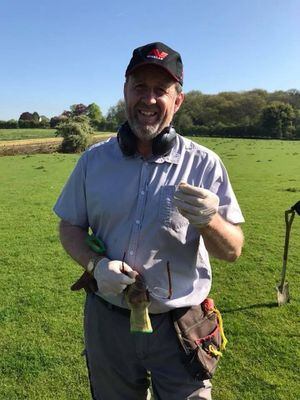Centuries-old gold ring found by Lichfield metal detectorist
A metal detectorist has discovered a centuries-old gold ring like no other – and it could net him hundreds of pounds at auction.

Guy Gordon, 56, a retired retail site manager from Lichfield, found the ancient posy ring, circa 1650/early 1700s, while out metal detecting on pastureland in May 2018.
And he was delighted because not only was it a bucket-list find, research revealed it featured a unique inscription – ‘Fortunate If Favoured’.
He said: “As far as we know it’s the only posy ring in existence with that inscription. It went through Treasure Trove and the British Museum said there was no other ring bearing that message.
“I’ve been metal detecting for 44 years since the age of 13 and always wanted to find a posy ring. Most metal detectorists have a bucket list of finds they’d like to unearth and a posy ring was on mine.
“I was excited when I found it. It was buried about seven inches deep in the ground. The signal was low. I found it on pastureland in Warwickshire. I’ve discovered a lot of things, from bronze and stone age objects to modern jewellery, but this is the most romantic find I’ve ever made.”
The 370-year-old ring is heading into Hansons Auctioneers’ on March 26-27 with a guide price of £500-£600 after being examined by the firm’s Historica consultant and renowned metal detectorist Adam Staples.
In 2019 Adam, from Derby, made headlines worldwide after being among a group of seven people who uncovered a £5 million hoard of 2,581 ancient silver coins dating back to the Norman Conquest of 1066 on Somerset farmland.
Adam, a valuer with nearly 20 years’ experience, said: “Guy’s find is a 22ct gold posy ring which would have been used as a wedding ring. It probably belonged to a young girl. It’s small but, back then, girls married as young as 13.
“The inscription is interesting. Typical posy ring messages include, 'I love and like my choice' or ‘In thy breast my heart doth rest’. This is a ring like no other. Whoever buys it will own something totally unique.”
Gold posy rings, sometimes spelled posy, posey or poesy rings, have an inscription on their surface. They were popular from the 15 th -17th centuries in England and France as lovers' gifts.
'Poesy' is derived from the old French word poesie, meaning 'The art or composition of poetry' and this refers to the inscription which is usually in rhyme.
Guy said: “I’ve decided to sell it now because I’ll never wear it. It’s so small it only fits on to the tip of my middle finger. I hope someone else will enjoy it. Perhaps it could be a wedding ring again.”





